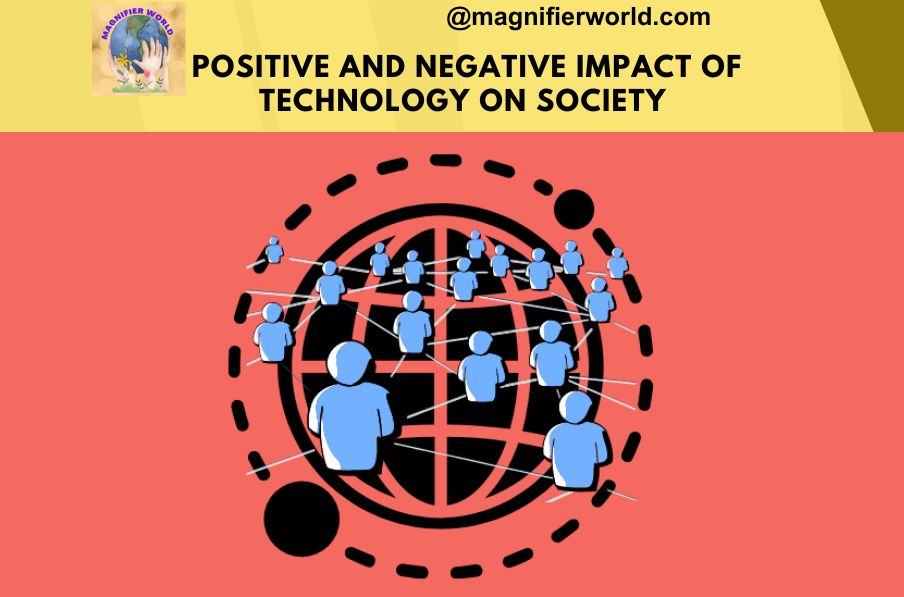The positive and negative impacts of technology on society have redefined the course of human existence. Technology has wielded an indelible influence over society. The evolution of technology stands at the nexus of this digital revolution. It becomes imperative to dissect the multifaceted impact it exerts. The way technology is used in society is a double-edged sword, yielding both positive innovations and negative repercussions.
How do new technologies affect our day-to-day lives? Take a look at the positive and negative impacts of technology on society today.
This article delves into the positive and negative impacts of technology on society, examining the transformative potential that technology offers. Highlighting the perils that lurk beneath its surface.
Technology has completely changed people’s communication. Social media and the internet have made it possible for people to communicate with each other globally in real-time. This has encouraged international cooperation, cross-border family ties, and cross-cultural understanding.
Not all individuals have equal access to technology. This digital divide creates disparities in education, employment opportunities, and civic participation, perpetuating existing social and economic inequalities. the positive and negative impacts of technology on society
While understanding technology, this article gives a brief overview of the positive and negative impacts of technology on society
The Positive Stride
Innovation, the cornerstone of technological progress, has propelled society to unfathomable heights. Communication is one of the key areas where technology has had good effects. The emergence of the internet, social media, and cell phones has transcended national borders to create a global village. Instant connections between people from different origins encourage cross-cultural dialogue and deepen comprehension.
Learn about the positive and negative impacts of technology on society and find out what we can do to minimize its negative effects.
The internet is a vast repository of knowledge, enabling people to access information on virtually any topic. This democratization of information has empowered individuals to educate themselves, make informed decisions, and engage in intellectual pursuits more easily.
Education, once confined to traditional classroom settings, has undergone a revolutionary metamorphosis. E-learning platforms and online courses have democratized education, making learning accessible to a broader demographic. This shift has the potential to bridge the educational divide and empower those previously excluded from formal education systems.
Healthcare is another sphere profoundly revolutionized by technology. Electronic health records, telemedicine, and cutting-edge medical equipment have expedited the diagnosis and treatment processes. Patients in faraway locations can now obtain expert medical advice thanks to the development of virtual medical consultations. Technology has also helped boost medical research, accelerating the development of new cures and therapies.
The medical field has seen remarkable progress due to technology. Telemedicine, wearable health devices, and advanced medical equipment have enhanced diagnosis and treatment. Technology has also sped up the creation of new drugs and medical studies, improving patient outcomes.
The positive and negative impacts of technology on society have catalyzed economic growth. Industrial productivity has increased thanks to automation and artificial intelligence, which has resulted in shorter production cycles and lower error rates. E-commerce platforms have changed the way that shopping is done, giving customers ease and access to a huge range of goods. In this digital age, startups and small enterprises have thrived by utilizing technology to access worldwide markets.
E-commerce and remote employment are two examples of innovative business models made possible by technology. Entrepreneurs, small firms, and individuals looking for flexible work arrangements now have more economic alternatives thanks to this.
Technology is constantly changing, which has both positive and negative impacts on our society. Read about it here!
The Negative Abyss
The spread of technology has not, however, been without its share of drawbacks. The loss of privacy is one urgent issue. The digitization of personal data and the widespread use of surveillance technology have raised questions about the security of personal data. Cyberattacks, data breaches, and identity theft are all on the rise and pose major risks to both people and businesses. positive and negative impacts of technology on society.
The positive and negative impacts of technology on society regarding privacy have grown significantly in the digital age. The security of individuals has been compromised as a result of breaches and misuse of private information brought on by the collecting and sharing of personal data, frequently done without explicit authorization.
The digital divide that has resulted from the quick development of technology has widened already existing societal disparities. Access to technology is not equitable across regions and demographics, creating a disparity in opportunities. Those without access to digital resources are disadvantaged in education, employment, and civic participation, perpetuating a cycle of disadvantage.
Automation, though enhancing efficiency, presents a grim prospect for the workforce. The displacement of human labour by machines and algorithms has generated concerns about job obsolescence. Low-skilled workers are particularly vulnerable, as their roles can be easily automated. The resultant unemployment and economic instability necessitate the reimagining of labour markets and the implementation of comprehensive retraining programs.
Paradoxically, while technology connects people virtually, it can also contribute to social isolation. Excessive screen time, online interactions replacing face-to-face connections, and the rise of cyberbullying are all factors contributing to this issue.
The rise of social media has also introduced novel challenges. The instantaneous dissemination of information, while fostering connectivity, has paved the way for misinformation and the erosion of critical thinking. The spread of fake news, echo chambers, and online harassment are manifestations of the darker aspects of digital interaction, undermining societal cohesion.
The digital age has raised significant concerns about privacy. The collection and sharing of personal data, often without explicit consent, has led to breaches and misuse of private information, compromising individuals’ security.
Navigating the Technological Terrain
In the midst of this technological maelstrom, the key lies in striking a balance between harnessing the benefits and mitigating the pitfalls. Policy interventions play a crucial role in shaping the impact of technology on society. Governments must ensure equitable access to digital resources, bridging the digital divide and providing marginalized communities with the tools to thrive in the digital age.
Privacy safeguards are paramount. Robust data protection laws and regulations can shield individuals from unwarranted intrusions and data breaches. Technological companies must assume ethical responsibilities, prioritizing user privacy and data security in their operations.
The growth of the digital divide is one of technology’s most urgent problems Technology’s promise of communication and information availability is growing. However, not all individuals and groups have equal access to these resources. This divide leads to differences in education, employment prospects, and even civic engagement. To navigate this terrain, concerted efforts are needed to bridge this gap.
To guarantee that everyone has fair access to digital tools and knowledge, governments, non-profit groups, and tech corporations must work together. The playing field can be levelled by initiatives like educational initiatives, subsidized internet access, and neighbourhood technology hubs. If we want to give people the abilities they need to function in the digital age, training needs to alter.
Adaptability and digital literacy are crucial abilities in a culture that primarily relies on technology. To create a generation that is not just adept at utilizing technology but also discerning in its usage, these skills should be taught in schools as part of the curriculum.
The business realm also has a role to play. While automation can enhance productivity, responsible automation strategies should be adopted, considering the socio-economic impact on the workforce. Companies can invest in retraining and upskilling programs to facilitate the transition of employees into roles that require uniquely human skills.
Amidst the immersive digital landscape, it’s crucial to foster a sense of digital well-being. The constant connectivity and notifications can lead to digital fatigue and a sense of detachment from the physical world. To navigate this aspect, individuals must practice mindful consumption of technology.
Setting boundaries for screen time, engaging in offline activities, and prioritizing face-to-face interactions contribute to a healthier relationship with technology. Moreover, tech companies can design user interfaces that promote digital well-being by providing tools to manage screen time and reduce distractions.
It’s clear that the journey is a team effort as we negotiate the technology landscape. The impact of technology on society is heavily influenced by businesses, academic organizations, and individuals. Technology can be controlled such that it has as few negative impacts as practical and as many beneficial effects as is conceivable.
Although achieving this delicate balance is not without difficulties. It is a goal that bears the promise of a more just, knowledgeable, and peaceful future. Let’s steer this course with caution, accountability, and a common dedication to utilizing technology for the benefit of all.
- positive and negative impact of technology on society
The Confluence of Progress and Responsibility
The annals of human history are punctuated by technological milestones that have redefined our existence. From the invention of the printing press to the revolution brought about by the internet, each advancement has pushed the boundaries of possibility. Today, artificial intelligence, biotechnology, and blockchain stand as a testament to our remarkable ingenuity.
These discoveries have the potential to change entire sectors, address challenging problems, and improve quality of life. The significant obligation that comes with this rapid advancement is the responsibility to properly consider the implications of these developments for society, humanity, and the natural world.
As technology takes centre stage, the ethical dimensions of its deployment become increasingly pronounced. Privacy breaches, data manipulation, and the potential erosion of human agency underscore the need for an ethical framework that safeguards against unintended consequences. The digital realm, with its boundless connectivity, is a fertile ground for both positive interactions and negative manipulations. To navigate this ethically charged terrain, it is imperative to prioritize transparency, accountability, and user autonomy.
The impact of technology reverberates through the fabric of society, from the dynamics of labour to the way communities interact. Automation, while enhancing efficiency, also has the potential to disrupt livelihoods. Navigating this landscape involves embracing the ethical duty to ensure a just transition.
Governments and corporations must invest in reskilling and upskilling programs, allowing workers to adapt to the evolving job landscape. Ethical considerations demand that the benefits of technology extend equitably across society, bridging divides and mitigating disparities.
The intersection of technical advancement and societal well-being places society at a crossroads. Governments, companies, and individuals are all responsible for utilizing technology’s transformational potential while avoiding its dangers. Let’s walk lightly as we explore the positive and negative impacts of technology on society and work toward a time when technology’s advantages outweigh its drawbacks.
Conclusion
Technology’s impact on society is a confluence of progress and responsibility. Its positive strides have elevated communication, education, healthcare, and economic prosperity. Simultaneously, its negative abyss entails threats to privacy, the digital divide, job displacement, and the proliferation of misinformation.
FAQs related to the positive and negative impact of technology on society
Q What impact has modern technology had on society both positive and negative?
Technology has positive and negative impacts on society. Technology has improved communication, information access, and medical treatment. It has also contributed to job loss, cyberbullying, and digital addiction.
Q What are the negative effects of technology?
• Depression and Other Mental Health Issues. A University of Michigan study found that Facebook use led to a decrease in happiness and overall life satisfaction. …
• Lack of Sleep. …
• ADHD. …
• Obesity. …
• Learning Barriers. …
• Decreased Communication and Intimacy. …
• Cyberbullying. …
• Loss of Privacy.
Q How technology has changed our society?
By seeping into every aspect of our lives, technology has changed the way we behave and operate. From communication and transport to healthcare and connectivity, technology has enhanced our lives for the better. The best part is that it is ever-evolving by facilitating more advanced features.
Q What are the benefits of technology in society?
• Quick access to information.
• Facilitated learning.
• Breaking the distance barrier.
• Simplifying tasks.
• Providing entertainment.
• Increased productivity and efficiency.
• Increased life expectancy.
• Creating new jobs.
Q Is technology good or bad for society?
Both beneficial and negative consequences of technology have been seen on society. Even if technology has made it simpler to communicate, and acquire information, It has negatively impacted job loss, cyberbullying, and digital addiction.
Q How technology affect our identity?
Technology’s Impact on Identity: Self-Identity vs. Social Identity. The way people regard themselves and others has changed as a result of technology. Additionally, it has altered how people communicate. This enables both favourable and unfavourable effects on a person’s sense of self.
The above article is related to the positive and negative impacts of technology on society.





